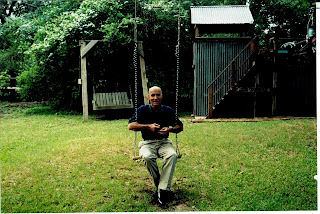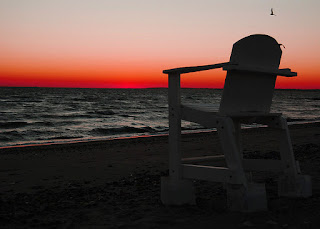Continued from Part 33
At admission, Mom had provided the hospital staff with a copy of the medication log that we had been using for Dad at home with names, dosages, and dosage times for each of the dozen or so drugs that Dad had been prescribed. Several of these had been switched over to IV-form and added into the IV line; a few were brought in for Dad to take in pill-form as he had been at home, which was a problem because he could barely swallow. Even after a phone call to the oncologist’s nurse and discussion with the nursing staff at the hospital, I was still concerned about the expectation that he could effectively and safely swallow pills and because some of the dosages being administered didn’t match what he’d been taking.
When the oncologist came to see Dad on the oncology floor mid-morning after Dad had been admitted, he rewrote the medication administration orders. He looked at Dad and said that, although he felt it was unlikely that the cancer had advanced at this point given the treatment protocol Dad was on, we couldn’t be sure about anything until we could get an MRI, which he felt wouldn’t be possible for at least another day or two due to Dad’s decreased level of alertness and his pain level.
His main plan seemed to be waiting to figure out what the plan was, which, as the family of any cancer patient knows, is NOT a good plan at all. Delays are Enemy #1 when dealing with an aggressive cancer like Glioblastoma, but, until we knew more about what had caused Dad to decline so rapidly in such a short period of time, waiting was really all we could do.
The oncologist told us that in addition to a blood transfusion and platelets that he was considering ordering to boost Dad’s blood count, he also wanted Dad to get a medication called Neupogen, which is a growth factor that stimulates the production and activation of neutrophils, a type of white blood cell. At the mention of the drug, an alarm went off in my head, and, upon quickly reviewing notes in the Notebook, I saw that Neupogen was listed on the treatment protocol that Dad was on from Duke under Things To Avoid. On the paperwork we’d been given at the Brain Tumor Clinic, I had scribbled a note out to the side that read, “As a growth factor, admin of this rx – potentially counteractive to Avastin.” I showed the info to the oncologist who looked perplexed; evidently, he did not already have this information, even though he had used Avastin to treat other patients before Dad.
The next move was for the oncologist to consult with the neuro-oncologists at Duke who had authored the protocol; our guy said he would get right on that and get back to us on the Neupogen. “We need to get his blood counts back up,” he said as he left the room, “and then he will get exponentially better.”
Dad had had an appointment to get a monitoring-type of MRI that very afternoon and had been scheduled to get Avastin and chemo the next day, and I was filled with disappointment that our plans had had to change. Thinking that we could get some GOOD news for a change, I’d been so focused on getting that follow-up MRI, despite the fact that I, like Dad and like the rest of my family, had developed a raging case of Scanxiety. Now that he was too sick to even get an MRI (and considering the fact that when he did get one it would be to check for problems instead of monitoring for progress), I saw that I should have been grateful for him have the chance to get the scan instead of the alternative, but, as usual, that was all only seen in hindsight. Now, instead of at least having a Plan, we were left with only a cancelled plan and confusion.
And fear. Dad was so weak at this point that he couldn’t lift his head from the pillow, couldn’t suck liquids from a straw, and could barely talk loudly enough for us to hear. He had a deep cough, and the coughing exhausted him and made his throat and chest hurt. When asked, he reported that he had a headache “in the middle” or “in the top” of his head ("seven or seven and a half out of ten" on the pain scale, he said), which of course made us think that the cancer had spread despite the oncologist’s prediction.
For the rest of that day, Dad was in and out of a medicated fog, on a heart monitor, with multiple IV lines going, and getting oxygen through a tube in his nose. In getting him settled in the hospital bed after he was admitted, the nurse had discovered a pressure sore the size of a pencil eraser on his low back. A wound care team consult was ordered, and this area was cleaned, treated, and dressed; Dad later told us that that sore hurt almost as much as his head had been hurting, another dire consequence of an impaired immune system. By late afternoon, the Infectious Disease team had ruled out viral meningitis, and over the next 48 hours cultures were going to be grown in the lab to test for bacterial or fungal meningitis, pneumonia, and other types of infection.
As hard as it had been to get through the stressful, sleepless nights since Dad’s diagnosis, that was nothing in comparison to the first night of the second time Dad hospitalized: it was the first night that I thought that it was entirely possible that Dad wouldn’t survive, not just the cancer but the night. We were lucky enough to have our case assigned that night to a nurse named Meredith, who provided exceptional quality of care for Dad and who took Dad and my family under her wing, even requesting to have Dad as her patient on other shifts she worked while we were on her floor. She provided highly commendable care for Dad and for us; she seemed to see not just Dad but those of us caring for him as her patients, and she gave us not only the physical support we needed but some much-needed emotional support as well. As my sister later said, Meredith appeared to see Dad through our eyes, and that is something that was so significant to us and that we will always remember.
Even in the haze of the pain and the pain medications, Dad strived to be appreciative and polite. With his throat incredibly sore, he offered a husky “Hello!” to the woman who came in to empty the trash can in the room, and he gave a gravely “Thank you!” whenever one of us used a finger to hold liquid in a straw and then release it in his mouth or when we put chapstick on his cracked lips. He, of course, took an instant liking to Meredith, as did we. She bore a resemblance to one of my sister’s best friends from high school, a girl named Angie. Despite the fact that Dad hadn’t seen Angie in many years, he too noticed the similarity in Meredith’s appearance and started calling her Angie, which Meredith said she took as a compliment. “I feel like I’ve known you for a long time, too!” she told Dad, which made him smile and warmed our hearts.
Not long into her shift, Meredith said she had orders to administer Neupogen; I relayed my concerns and the earlier discussion with the oncologist to her, and she put a call in to the doctor to verify the orders. Contrary to his earlier commitment to “get back” to us on the issue, the oncologist hadn’t communicated with us at all on the Neupogen verdict, but over the phone he told Meredith that he had consulted with the doctors at Duke and they had agreed that the priority was to boost Dad’s blood counts and thus the drug should be given. This was the first of many points of confusion and miscommunication (or non-communication) in Dad’s care, but, like the rest of the family, I was grateful that the medicine was being given despite the way we’d found out about it because I was desperate to find something that could help Dad get through what I saw as a bump in the road, even if it took altering the protocol or the plan to do that.
Over the course of the next several days, I worried a lot about how and when Dad could get the next dose of chemo/Avastin; I made fervent notes in the notebook about it in between the times the oncologist came by to check on Dad. When I asked about when Dad could get it again, the oncologist said we needed to get Dad stabilized, and then he added, “Avastin has a three-week shelf life, and it’s only been two weeks since he’s had it, so we aren’t losing ground if we can get it in him within the next week.”
I wanted that Avastin for Dad like I was an addict on a street corner. I was like a boxer warming up before going into the ring, punching the air and wearing a super-tough look on his face. Maybe even growling a little: Here we come, Cancer, and we’re going to kick your ass! But I was wrong. The cancer, the treatment, the illness didn’t even give us a chance to step into the ring. We were so tired of Cancer and of tears and terror; we needed some Good News, but, other than the fact that Dad was still in the game at this point, there were none to be had. Cancer could wreak havoc on Dad’s body, but it couldn’t touch our love.
Up next … Part 35 – Hanging On















